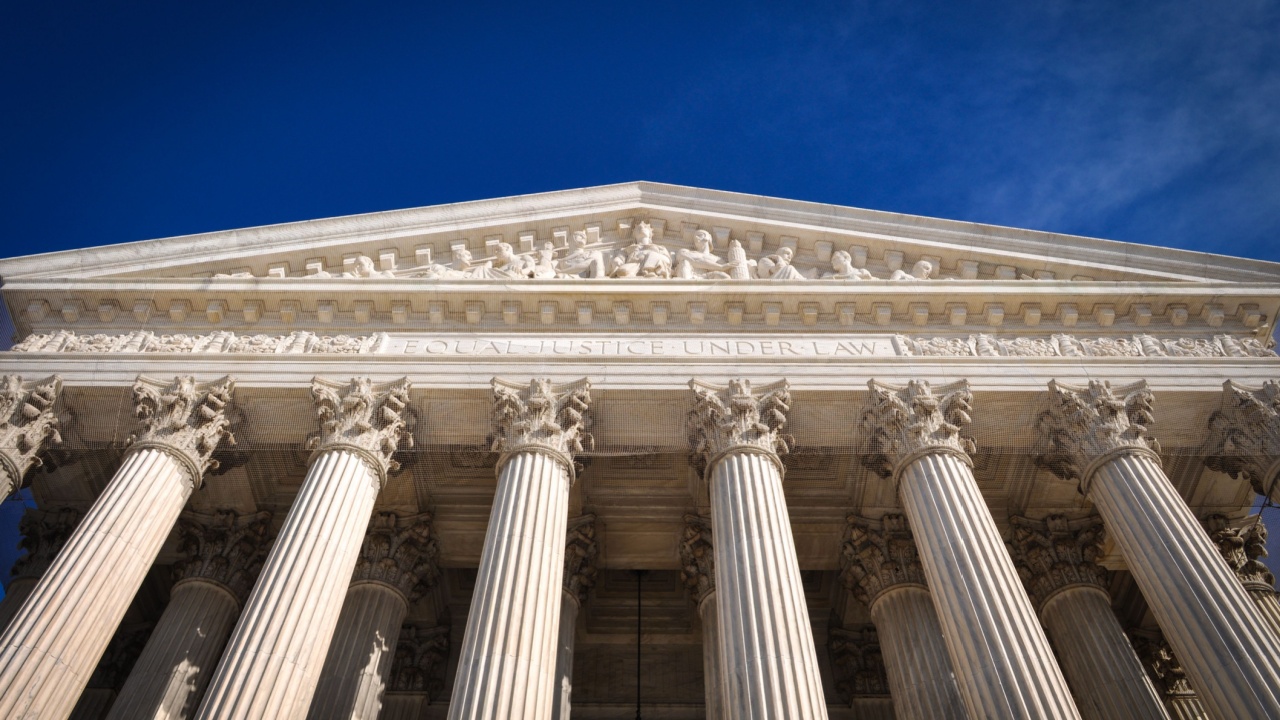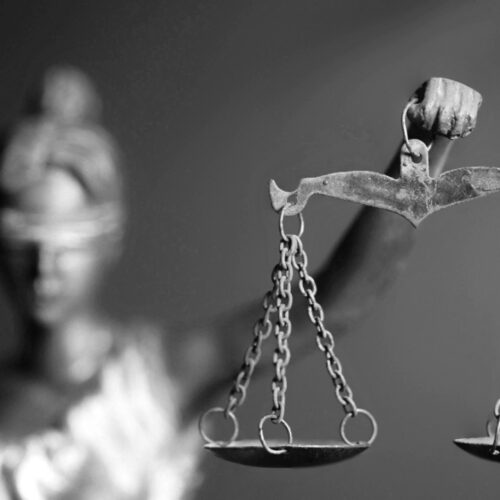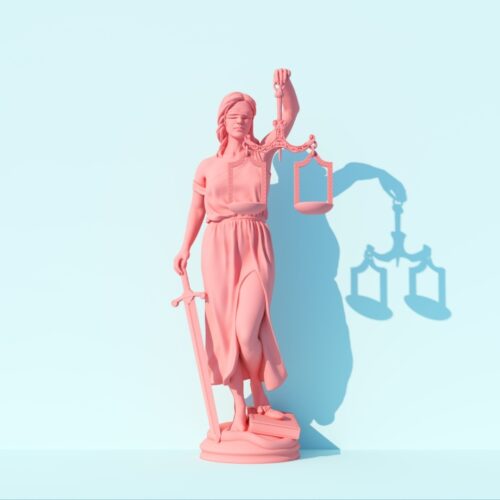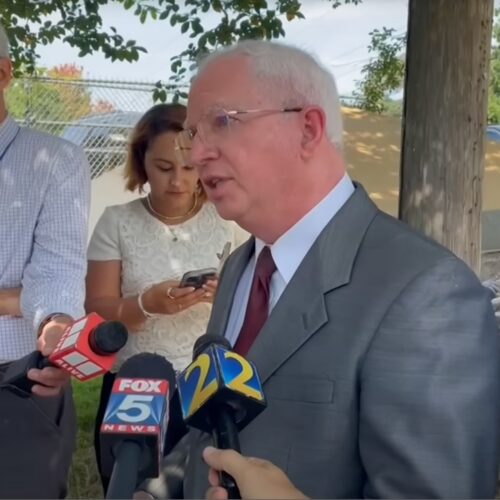The Rule of Law Depends on John Eastman

Editor’s Note: America is in the midst of a cold civil war. On the one side are the defenders of our constitutional regime. On the other is a revolutionary enemy: the group quota regime, which has turned our own legal system into one of its primary weapons, lawfare. When someone runs afoul of the group quota regime, he can expect lawfare to be inflicted on him with all the viciousness appropriate to wartime.
This is what happened to John Eastman, an attorney who has been ruthlessly persecuted by the enemy for the crime of providing legal advice to President Trump amid the contested 2020 election. As Mark Pulliam writes, the questions at stake here are foundational ones; the rule of law, and the rights of citizens. These are threatened in this war. Whether the group quota regime triumphs over the American regime may well hinge on whether this lawfare is allowed to stand.
The rule of law depends on the even-handed application of laws—thus, the blindfold on statues depicting Lady Justice, derived from the Roman figure Justitia. In our adversary system of justice, a legacy of the Anglo-Saxon common law system brought to our shores by colonists from England, the resolution of legal disputes requires the zealous representation of litigants by attorneys and an impartial—or “neutral”– decisionmaker. Legal scholars have described the adversary system as a keystone of individual liberty and due process of law. The indispensability of legal representation, even in unpopular causes, has been a pillar of American jurisprudence since 1770, on the eve of the American Revolution, when John Adams courageously undertook the defense of British soldiers accused of murdering five colonists in the so-called Boston Massacre.
As we shall see, this historical episode, which legal journalist Dan Abrams has called the “most important case in colonial American history,” provides a stark contrast to travails resulting from the representation of President Donald Trump by California attorney John Eastman, who is facing disbarment, criminal prosecution, and other forms of retribution for providing legal advice to an unpopular client in connection with the controversial 2020 presidential election. How times have changed.
Adams, a leading patriot and a lawyer, risked his family’s livelihood and incurred the considerable opprobrium of his fellow Bostonians because he believed that everyone—even the hated Redcoats–was entitled to a fair trial. A fair trial, Adams understood, requires legal representation by an attorney. When other Boston attorneys refused to defend Captain Thomas Preston and eight of his soldiers charged in the shooting, Adams agreed to do so. Adams realized that the inflamed passions of the community, fueled by the anti-British rhetoric of Paul Revere and the Sons of Liberty (led by Adams’ second cousin, Samuel Adams), could lead to a miscarriage of justice without competent legal representation for the soldiers.
Adams methodically presented the evidence in two trials, eventually convincing a Boston jury to acquit Preston and six of the soldiers; two soldiers were convicted of manslaughter. Without Adams’ courageous defense, it is likely that all the British soldiers would have faced the gallows. Instead, Adams went on to help draft the Declaration of Independence, to serve as George Washington’s vice president for two terms, and to succeed him as the second President of the United States. Adams later reflected that his fraught participation in these highly contentious trials was “one of the best Pieces of Service I ever rendered my Country.” To this day, American lawyers are ethically required—duty-bound!—to represent their clients zealously. In the words of the American Bar Association, “A lawyer must…act with commitment and dedication to the interests of the client and with zeal in advocacy upon the client’s behalf.”
250 years after the tumultuous events of the Boston Massacre, John Adams is regarded as a heroic Founding Father. John Eastman, in contrast, is falsely being pilloried as an insurrectionist. What explains the difference in treatment? The short answer is “lawfare.” As I have explained elsewhere, the left has perfected the strategy of punishing its political enemies through malicious resort to legal proceedings (civil and criminal) calculated to pauperize and destroy the targets of its wrath. Sadly, Eastman is not the only victim of lawfare, but his case is the most compelling. The left is making an example of him, warning center-right lawyers not to represent Republican candidates in future election disputes—or else.
Had Eastman been representing a different presidential candidate, such as David Boies did in smash-mouth fashion when challenging George W. Bush’s victory over Al Gore in 2000, he may have been feted as a celebrity—as Boies was. The more aggressive and ethically dubious Boies’s tactics, the louder the acclaim, even in defeat. Such it is with team sports. Alas, the left-leaning legal culture roots for Democratic candidates (and their lawyers), and it is glaringly apparent that the rules are not the same for Republicans. Eastman’s former client, Donald Trump, faces an even more daunting lawfare gauntlet than Eastman, for having the temerity to seek the White House again (and persisting with his objections to the problematic 2020 election), but at least Trump has the resources and pulpit to defend himself. The jackals pursue Eastman precisely because his limited resources and relative anonymity make him vulnerable prey. Without his law license, Eastman is unemployable. They seek to ruin him—and they are succeeding.
Prior to January 6, 2021, Eastman was at the peak of his career: Law professor (and former dean) at the Chapman University law school, former clerk to Supreme Court Justice Clarence Thomas, frequent speaker at Federalist Society events, prolific legal scholar, noted appellate litigator (participating in over 200 cases before the Supreme Court), founding director of the Claremont Institute’s Center for Constitutional Jurisprudence, and, in 2010, Republican candidate for California attorney general. Now, his career is in shambles. He was forced to retire from Chapman, dismissed from a visiting professor gig at the University of Colorado, indicted (along with Trump and others) in scandal-plagued Fulton County, Georgia, hauled before congressional committees, and—as of March 27, 2024—made ineligible to practice law in the state of California.
In a 128-page decision, following an unprecedented 35-day-long hearing (over the course of ten weeks), the California State Bar concluded that Eastman should be disbarred. Eastman’s disbarment trial, conducted by a Democrat-donor hearing officer, was the longest, most expensive disbarment proceeding in American history, costing Eastman over $750,000. State Bar Judge Yvette Roland was emphatically not a neutral decisionmaker. The ruling, subject to review by the California Supreme Court, was foreordained.
What was Eastman’s supposed “crime”? He gave legal advice to Trump concerning the mechanics of electoral vote counting pursuant to the 12th Amendment and the Electoral Count Act of 1887—an arcane topic with little relevant caselaw. Based on this advice, Trump believed that the vice president had the authority to defer the counting of electoral votes on January 6 pending the resolution of election disputes in several swing states. Similar attempts to pause the electoral vote count were made by Democrats in 2002, 2005, and 2017, without controversy, let alone charges of “coups” or “insurrection.” As we now know, Vice President Mike Pence declined to follow this course and the election was certified on January 6, as scheduled.
What, then, is the basis for the scorched-earth campaign of lawfare against Eastman? Several factors are at work. The merits of Eastman’s legal advice are not black and white; legal advice often falls into the “gray” zone. Many areas of law are vague or untested; zealous advocacy requires robust—even aggressive—arguments, similar to John Adams’ bold defense of the Redcoats in 1770. But Eastman did not misrepresent facts, lie, steal, commit fraud, or engage in moral turpitude, the typical grounds for disbarment. A summary of Eastman’s legal theory is laid out in an essay he wrote for The American Mind on January 18, 2021, and the background of the contentious events leading up to January 6 is explored in a detailed back-and-forth between Eastman and Joseph Bessette in the Fall 2021 issue of the Claremont Review of Books.
Given the ambiguity of the text of the 12th Amendment, the paucity of authority regarding its interpretation, and the complicated, poorly understood history of similar presidential election disputes (especially the 1800 and 1876 elections), it is impossible to fairly conclude that Eastman’s advice went beyond good faith, zealous advocacy. As a former colleague of Eastman’s pointed out, he “did the same thing every other American lawyer worth his salt does every day: advocate zealously for their clients, based on the facts and the law.”
But the motives of Eastman’s critics are not driven by the merits. His only “crime” was representing a client the left despises. The California Bar complaint was initiated by hard-left activists (The 65 Project) led in orchestrated fashion by the execrable partisan hack David Brock, who professed that their goal is to “not only bring the grievances in the bar complaints, but shame them and make them toxic in their communities and in their firms.” Brock added, tellingly, that “the littler fish are probably more vulnerable to what we’re doing.” The acknowledged goal of the lawfare campaign, as reported by Axios, is “starving any future efforts of legal talent as well as focusing on 2020. ‘This is mostly important for the deterrent effect that it can bring so that you can kill the pool of available legal talent going forward,’ according to a person involved with the effort, who asked to remain anonymous.”
This is naked political warfare by the self-styled regime against its opposition. Democrat election lawyer Marc Elias is free to file lawsuits rigging elections in favor of progressive candidates, but Republican lawyers face persecution if they resist. The unmistakable message is: submit to our authority or you will be destroyed. Weaponizing the legal system in this fashion is the antithesis of the rule of law.
Moreover, the lawfare against Eastman and others threatens to reverse a long tradition of promoting trailblazing reforms through creative legal advocacy. Before she was appointed to the Supreme Court, Ruth Bader Ginsburg led the ACLU’s litigation program to achieve equal rights for women. Likewise, Thurgood Marshall was a civil rights pioneer for the NAACP, litigating Brown v. Board of Education and other cases, before joining the high Court. The history books are full of crusading legal mavericks who were controversial in their time: Clarence Darrow, William Kunstler, Louis Brandeis, Ralph Nader, Jack Greenberg, and many others.
Lawyers pushing the limits of the law were responsible for many important reforms in the areas of civil rights, worker rights, product safety, criminal procedure, and investor protection. The specter of disbarment, criminal prosecution, and financial ruination would have stifled the adversary system that made these reforms possible.
Eastman is not a rich man. Despite his stellar credentials, he did not pursue a fancy corner office in a white shoe law firm, earning millions of dollars a year. Instead, he chose a career in academia and public service. Defending himself in the myriad vindictive proceedings has cost him dearly, depleting his personal savings and even his (and his wife’s) retirement accounts. Eastman’s legal defense fund has raised over a half-million dollars, but the staggering cost of defending all the politically motivated proceedings could reach as high as $3-3.5 million. Eastman has already incurred $1.5 million in legal costs, and the Georgia prosecution is just warming up. Lawfare proponents do not have to prevail in order to defeat their enemies; the process alone is the punishment.
America is at an inflection point, and Eastman is the symbolic victim—the proverbial canary in the coal mine. If the left succeeds in destroying Eastman, we could all be next. Will we be governed by the rule of law, or be subject to the arbitrary whims of despots? Will we preserve our adversary system of justice or succumb to mob rule? “When our founders pledged their lives and their fortunes and their sacred honors to create a government of a free people with free institutions, they put everything on the line,” Eastman reminds us. In a fundraising letter, Eastman bears his terrible travails gracefully, explaining that “my wife and I came to the conclusion—independently, but the same conclusion—that there is perhaps nobody in America better equipped to handle the assault that is being leveled at me.”
Eastman is willing to fight, but he cannot stand alone. He needs our help. If you oppose the despicable campaign of lawfare being waged against Eastman, and if you want to support his struggle against the evil forces seeking to destroy him, consider making a generous donation to the John Eastman Legal Defense Fund.
His fight is your fight. His plight could be your fate. At the signing of the Declaration of Independence on July 4, 1776, Benjamin Franklin reportedly quipped “We must all hang together, or assuredly we shall all hang separately.” Conservatives must take a stand, and the time is now.
Mark Pulliam is a lawyer and writer living in east Tennessee. He blogs at misruleoflaw.com.


